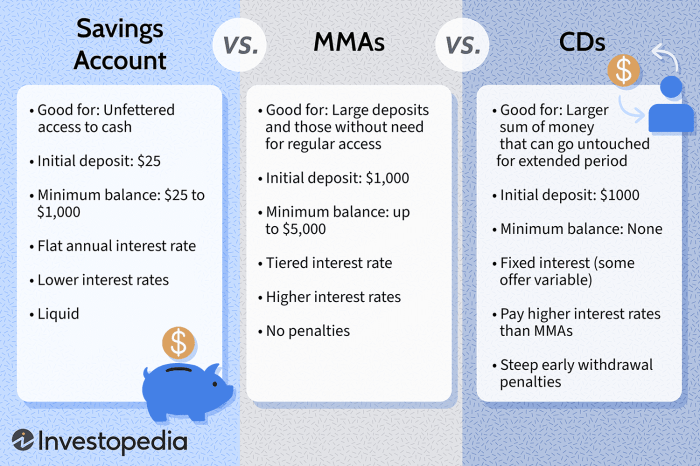What is Alabama law about co-owned savings accounts? This question often arises when individuals consider shared financial management. In Alabama, the law offers various options for joint ownership, each with unique implications for inheritance, liability, and taxation. Understanding these options is crucial for ensuring smooth financial transitions and protecting your assets.
This guide delves into the specifics of Alabama law regarding co-owned savings accounts, examining different types of joint ownership, legal requirements, and the responsibilities of each account holder. We will also explore potential legal issues and provide practical advice for managing these accounts effectively.
Types of Joint Ownership in Alabama
In Alabama, savings accounts can be held in joint ownership, which means that two or more people share ownership of the account. There are two main types of joint ownership in Alabama: joint tenancy with right of survivorship and tenancy in common. Each type has unique implications for how the account is managed and distributed upon the death of one of the owners.
Joint Tenancy with Right of Survivorship
Joint tenancy with right of survivorship is the most common type of joint ownership for savings accounts in Alabama. In this type of ownership, each owner has an equal and undivided interest in the account. Upon the death of one owner, the surviving owner automatically inherits the deceased owner’s share of the account. This means that the account continues to exist, and the surviving owner has full ownership of the funds.
For example, if John and Mary own a savings account as joint tenants with right of survivorship and John dies, Mary automatically becomes the sole owner of the account.
This type of ownership simplifies the inheritance process, as the account does not need to go through probate. However, it’s important to note that the surviving owner is responsible for any taxes due on the deceased owner’s share of the account.
Tenancy in Common
Tenancy in common is a less common type of joint ownership for savings accounts in Alabama. In this type of ownership, each owner has a specific percentage interest in the account. Upon the death of one owner, their share of the account passes to their heirs, not to the surviving owner.
For example, if John and Mary own a savings account as tenants in common with John owning 60% and Mary owning 40%, and John dies, his 60% share of the account will be distributed to his heirs according to his will or the laws of intestacy.
This type of ownership allows for more flexibility in distributing assets, but it can complicate the inheritance process. The deceased owner’s share of the account will be subject to probate, which can be time-consuming and expensive.
Alabama Laws Governing Joint Accounts
Alabama law recognizes joint ownership of savings accounts, allowing individuals to share ownership and control over the funds. This legal framework governs the rights and responsibilities of joint account holders, ensuring clear guidelines for managing shared finances.
Establishing a Joint Savings Account in Alabama, What is alabama law about co-owned savings accounts
Establishing a joint savings account in Alabama involves specific legal requirements to ensure clarity and protect the interests of all parties involved. The process typically involves the following steps:
- Agreement: Both individuals intending to open a joint account must agree to the terms of joint ownership. This agreement may be formalized in writing, although it’s not always legally required.
- Account Opening: Both individuals must present valid identification and sign the necessary paperwork to open the joint account.
- Designation of Ownership: The account opening documents should clearly specify the type of joint ownership, whether it’s joint tenancy with right of survivorship or tenancy in common.
Rights and Responsibilities of Joint Account Holders
Once a joint savings account is established, both individuals hold specific rights and responsibilities. These rights and responsibilities are Artikeld in the account agreement and Alabama law.
- Right to Withdraw Funds: Each joint account holder generally has the right to withdraw funds from the account without the other’s consent. This right is based on the principle of equal ownership and control. However, some account agreements may include restrictions on withdrawals, such as requiring a minimum balance or a certain period of notice before withdrawal.
- Liability for Account Debts: Both joint account holders are equally liable for any debts incurred by the account, including overdrafts or unpaid fees. This means that a creditor can pursue either individual for the full amount of the debt.
- Right of Survivorship: In a joint tenancy with right of survivorship, the surviving joint account holder automatically inherits the deceased account holder’s share of the funds. This eliminates the need for probate proceedings and ensures the smooth transfer of assets.
Legal Considerations for Joint Savings Accounts
Several legal considerations should be taken into account when opening or managing a joint savings account in Alabama:
- Gift vs. Loan: If one individual contributes a significant portion of the funds to a joint account, it’s important to clarify whether the funds are considered a gift or a loan. This distinction can impact tax implications and the rights of each individual in the event of a dispute.
- Changes in Ownership: Any changes to the joint ownership structure, such as adding or removing account holders, must be documented and approved by all parties involved.
- Dispute Resolution: In the event of a dispute between joint account holders, Alabama law provides mechanisms for resolving disagreements. This may involve mediation, arbitration, or court proceedings.
Managing a Joint Savings Account in Alabama

Joint savings accounts in Alabama can offer benefits such as convenience, shared financial responsibility, and tax advantages. However, proper management is crucial to avoid potential conflicts and legal issues.
Best Practices for Managing a Joint Savings Account
Effective management of a joint savings account involves clear communication, meticulous record-keeping, and adherence to legal requirements.
- Establish Clear Communication Protocols: Regularly discuss financial goals, account access, withdrawal limits, and any changes to the account. This ensures both parties are aware of the account’s purpose and how it should be used.
- Maintain Comprehensive Records: Keep detailed records of all transactions, including deposits, withdrawals, and transfers. This documentation can be helpful in resolving disputes or providing evidence in legal proceedings.
- Regularly Review Account Statements: Both account holders should review account statements regularly to monitor transactions and ensure there are no unauthorized withdrawals or discrepancies.
- Utilize Written Agreements: For significant financial decisions or complex situations, consider creating a written agreement outlining the terms of the account, including ownership percentages, withdrawal restrictions, and dispute resolution processes.
Important Considerations When Opening and Managing a Joint Savings Account
Before opening a joint savings account, carefully consider the following factors to ensure a smooth and beneficial experience.
- Ownership Structure: Choose the ownership structure that best aligns with your needs and goals. Consider factors such as tax implications, inheritance rights, and potential liability.
- Account Access and Control: Determine the level of access and control each account holder will have. For instance, will both parties have equal withdrawal rights, or will one party have primary control?
- Account Purpose and Usage: Define the purpose of the account and how it will be used. This clarity can prevent future misunderstandings or disputes.
- Bank Policies and Fees: Understand the bank’s policies regarding joint accounts, including fees, minimum balance requirements, and withdrawal restrictions.
Potential Legal Issues with Joint Accounts
Joint savings accounts can lead to legal disputes if not properly managed. Here are some potential issues and ways to mitigate them:
- Unauthorized Transactions: One account holder may make unauthorized withdrawals or transfers, leading to disputes and potential legal action. To mitigate this, ensure both parties have access to account statements and review them regularly.
- Disagreements over Account Usage: Disagreements can arise regarding the account’s purpose, withdrawal limits, or spending priorities. Clearly defining the account’s purpose and establishing communication protocols can help prevent such issues.
- Inheritance and Estate Planning: The ownership structure of a joint account can impact inheritance rights and estate planning. Consult with an attorney to ensure the account aligns with your estate planning goals.
- Liability for Debt: In some cases, a joint account holder may be held liable for the other account holder’s debts. Understand the legal implications of joint ownership before opening an account.
Consequences of Joint Account Ownership: What Is Alabama Law About Co-owned Savings Accounts

Joint ownership of a savings account in Alabama comes with certain legal consequences, including potential liability for debts and impacts on inheritance. Understanding these implications is crucial before establishing a joint account.
Liability for Debts
When an account is held jointly, both owners are generally responsible for any debts incurred using the account. This means if one owner incurs debt using the account, the other owner is also liable for repayment. This liability can extend even if the other owner was unaware of the debt or did not authorize its creation.
For instance, if one joint owner uses the account to pay for personal expenses that they cannot afford, the other joint owner may be held liable for the debt, even if they were not involved in the spending.
Impact on Inheritance
Upon the death of one joint owner, the surviving joint owner automatically inherits the entire balance of the account, regardless of the deceased owner’s will. This is because the ownership interest in the account passes to the surviving owner by right of survivorship.
For example, if a couple has a joint savings account and one spouse dies, the surviving spouse automatically inherits the entire balance of the account, even if the deceased spouse’s will left the account to someone else.
Removing a Joint Owner
Removing a joint owner from an account can be a complex process, requiring legal action in most cases.
- If all joint owners agree to remove one owner, they can typically do so by following the bank’s procedures for changing account ownership.
- If the joint owners disagree, the owner seeking removal may need to file a lawsuit to remove the other owner. The court will consider factors such as the intentions of the original account holders and the circumstances surrounding the joint ownership.
Disputes Between Joint Account Holders
Disputes between joint account holders can arise from various issues, such as unauthorized withdrawals, disagreements over account usage, or differing views on how the funds should be used.
- In cases of unauthorized withdrawals, the affected owner can file a complaint with the bank or seek legal action to recover the funds.
- Disagreements over account usage can be addressed through negotiation or mediation, or through legal action if a resolution cannot be reached.
- Disputes over the use of funds can be resolved through negotiation, mediation, or court action, depending on the specific circumstances.
Final Thoughts

Joint ownership of savings accounts in Alabama provides a convenient way to manage finances, but it is essential to understand the legal nuances involved. By choosing the right type of joint ownership and adhering to best practices, you can mitigate potential legal issues and ensure a smooth financial experience. Always consult with a legal professional for personalized advice tailored to your specific circumstances.
Questions and Answers
What are the benefits of opening a joint savings account in Alabama?
Joint savings accounts offer several benefits, including shared access to funds, convenience for financial transactions, and potential tax advantages. However, it’s important to consider the potential downsides, such as shared liability and potential inheritance complications.
Can I remove a joint owner from a savings account in Alabama?
Yes, you can generally remove a joint owner from a savings account in Alabama, but the process may vary depending on the type of joint ownership and the bank’s policies. It’s essential to review the account agreement and consult with your bank to understand the specific procedures.
What happens to a joint savings account if one owner dies?
The outcome of a joint savings account upon the death of one owner depends on the type of joint ownership. With right of survivorship, the surviving owner automatically inherits the deceased owner’s share. With tenancy in common, the deceased owner’s share may pass according to their will or intestacy laws.
